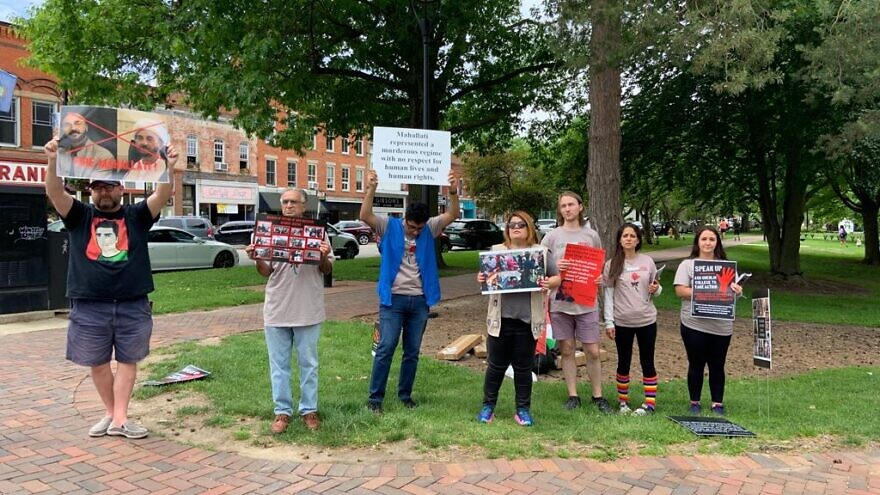Iranian Americans and Jewish Americans gathered in Oberlin, Ohio, over the weekend to protest the continued employment of Oberlin College and Conservatory professor with ties to Iran.
Mohammad Jafar Mahallati, who teaches Islamic studies at the college, served as Iran’s ambassador to the United Nations from 1987 to 1989 where he is alleged to have covered up the mass murder of political prisoners in the Islamic Republic.
He tweeted, “It’s unconscionable for @oberlincollege to continue employing Mohammad Jafar Mahallati, former Iranian regime official complicit in the #1988massacre of 5000+ Iranians. Oberlin’s Board of Trustees should be concerned about the reputational damage this is inflicting on the school.”
While at the United Nations, Mahallati has also called for violent global jihad against Israel. Speaking at the United Nations in 1988, he said: “The establishment of the Zionist entity was itself in violation of provisions of the United Nations Charter.”
The protest against Mahallati electrified the Iranian diaspora, as a direct action against a former top official of the Islamic Republic who has been leading a largely insulated life on the rustic Oberlin campus.
Lawdan Bazargan, an Iranian American human rights activist, has spearheaded the campaign to oust Mahallati. She told JNS, “Our campaign started with a simple request: Fire Mahallati, who denied the mass killings of our loved ones and shielded those responsible from accountability.”
Bazargan, a leading member of the Alliance Against Islamic Regime of Iran Apologists (AAIRIA), continued, “Since Oberlin’s president [Carmen Twillie Ambar] and its board of trustees decided to ignore us, ran a sham and non-transparent investigation, refused to meet with the victims’ families and started rumors about our independence and connections, we now have to appeal to politicians and state and federal authorities.”
Rep. Jim Banks (R-Ind.) is one politician who has heeded AAIRIA’s call.
“It’s distressing that Oberlin continues to ignore the victims of Iran’s terrorist regime, and continues to defend a former senior Iranian official on their faculty, who is cited in U.N. and Amnesty International reports as having worked to deny mass killings in Iran,” Banks said in late May.
“Oberlin owes everyone an explanation as to why Mr. Mahallati was hired in the first place despite his very questionable background, and why they’ve refused to conduct a transparent and independent investigation on this issue,” he said.
After Banks spoke out, Rabbi Abraham Cooper, the associate dean of the Simon Wiesenthal Center, told JNS: “Perhaps now Oberlin College will take action regarding why it hired, promoted and continues to protect an ex-Iranian regime figure.”
Frieda Fuchs, a former visiting professor in the college’s political science department who is a member of AAIRIA, told JNS: “Three pro-Mahallati protesters carried ‘Stop Political Racism’ signs. One of them sported a keffiyeh. It is not too hard to guess who the intended audience of the signs are. The fact that the relatives of the victims of the 1988 massacres in Iran are on campus for the third time speaks to the fact that Oberlin’s administrators have bought into the story that Mahallati is a soft-spoken professor of peace who is the victim of a well-funded and orchestrated smear campaign launched against him by right-wing Zionist and Iranian pro-Republican warmongers.”
Fuchs continued, “It is hard to understand why a school that prides itself on a history of supporting political freedoms and social justice for disadvantaged groups persistently refuses to engage with the relatives of the victims of Iran’s dictatorial regime, most of whom came from the political left.”
Bazargan said 16 protesters attended the anti-Mahallati event, including first- and second-generation Iranian Americans, members of the National Council of Resistance of Iran, monarchists, atheists, leftists and secular demonstrators.
There was “lots of support from students, parents and some alumni who were dismayed by the whole situation that such a person [Mahallati] is at the school and the administration is whitewashing it,” she said.
The activists from AAIRIA said they reached “hundreds of people” with flyers and in conversations.
Bazargan said at least two-thirds of the graduating students turned their back on the chairman of the Oberlin College board of trustees, Chris Canavan, because of allegations of union-busting and failure to pay the faculty fair salaries.
One student told a member of AAIRIA that students also turned their backs on Canavan because of the Mahallati affair.
Hamid Charkhkar, a member of AAIRIA, revealed that Mahallati is on the editorial board of Sepehr-e-Siasat, an academic journal tied to Iran’s regime. Charkhkar told JNS that Mohammad Bagher Khorramshad, Iran’s deputy interior minister for political affairs and a member of the U.S.-sanctioned Islamic Revolutionary Guard Corps, is also on the editorial board.
Susannah Johnston, an investigative reporter for Focus on Western Islamism, reported last week on Mahallati’s affiliation with Sepehr-e-Siasat. After the publication of her article, Mahallati’s name was scrubbed from the journal. Sepehr-e-Siasat promoted an article praising Hezbollah, wrote Johnston. The United States, Israel and scores of other countries have classified Hezbollah as a terrorist organization.
No response was received to JNS press queries to Oberlin College by press time. Mahallati has denied the allegation that he committed crimes against humanity in 1988. Oberlin College published a fact sheet on Mahallati in October 2021, claiming that he supported a “two-state solution that would allow Israel and the Palestinian people to exist together in peace.”
Oberlin College conducted an investigation into Mahallati last year. “The inquiry did not find proof to corroborate the allegations that professor Mahallati knew of the atrocities at the time he was asked about them during his tenure at the United Nations,” wrote the college on its website.
AAIRIA said the college’s inquiry was rigged because it was not independent and transparent. The college has refused to publish its full report on Mahallati.


























